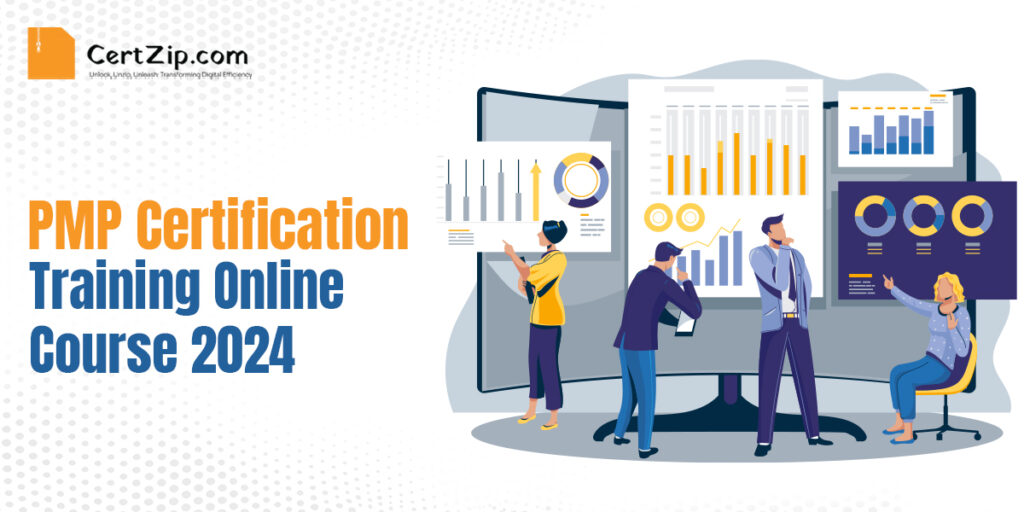When seeking a Project Management Professional (PMP) certification, choosing the “best PMP certification course” is unquestionably crucial. This online program is one such suggested course that uses the Project Management Institute’s (PMI) Project Management Body of Knowledge (PMBOK Guide) to prepare students for the PMP certification exam online.
Through covering all necessary knowledge areas and processes, and providing hands-on experiences via real-world examples and case studies. Moreover, this course equips students with the right skills and expertise to succeed in project management effectively. Ultimately, enrolling in the best PMP certification course will provide a strong foundation for attaining a successful career in project management.
Having a Project Management Professional (PMP) credential is revolutionary in the ever-changing field of project management. Moreover. the PMP certification has grown in importance as companies emphasize effective project management techniques more and more. In case you’re thinking about improving your professional opportunities, 2024 is an ideal year to sign up for an online PMP certification training course.
The advantages, course design, and other factors are examined in this article to show why online training is the best option for PMP certification exam.
Let’s talk about Course Objectives:
- Understand the project management framework and the five process groups (Initiating, Planning, Executing, Monitoring and Controlling, and Closing)
- Learn the nine knowledge areas (Integration, Scope, Time, Cost, Quality, Resource, Communications, Risk, and Procurement)
- Understand the 49 processes and their relationships
- Apply project management concepts, tools, and techniques to real-world scenarios
- Prepare for the PMP certification exam online.
Let’s talk more about Project Management:
- Overview of project management
- The Project management framework
- 3rd is the Project life cycle
- 4th The project management processes
Project management is the application of knowledge, skills, tools, and techniques to plan, organize, and control resources to achieve specific goals and objectives. Therefore it involves managing and coordinating various aspects of a project, including scope, time, cost, quality, resources, and stakeholders.
Overview of Project Management
Project management is a discipline that has been around for decades, but it has gained significant importance in recent years due to the increasing complexity and scope of projects. Moreover, effective project management is crucial for achieving business objectives, improving efficiency, and reducing costs.
Key Components of Project Management
- Scope: Defines what needs to be done to achieve the project objectives.
- Time: Establishes the timeline for completing the project.
- Cost: Determines the budget and resources required for the project.
- Quality: Verifies that the project complies with all necessary requirements.
- Resources: Determines and distributes the manpower, tools, and supplies that are required.
- Stakeholders: Identifies and engages with the individuals and groups affected by the project.
Project Management Framework
It’s essential to stay up to date on project management knowledge and abilities if you want to succeed in the fast-paced workplace of today. Moreover, you can choose “best project management certification courses” as well for better growth.
- The PMBOK, or the Project Management Body of Knowledge: A group of widely accepted best practices for project management that include techniques, protocols, and knowledge domains.
- PMI, the Project Management Institute: A professional association offering tools, training, and certification to project managers.
- Agile Approaches: An incremental and iterative project management methodology that prioritizes adaptability and teamwork.
Project Life Cycle
The sequence of stages a project goes through from start to finish is known as the project life cycle. The typical phases of a project life cycle are crucial to understand, especially when pursuing the best PMP certification training:
- Initiation: Defines the project scope, goals, and objectives.
- Planning: Develop the project plan, including scope, schedule, budget, and resources.
- Execution: Carries out the project tasks and activities.
- Monitoring and Control: Tracks and controls the project progress, and identifies and addresses deviations from the plan.
- Closure: reviews the project’s success, records lessons learned, and formalizes the project’s completion.
Project Management Processes
The specific activities Project management processes and tasks that are performed to manage a project. The five process groups are:
- Initiating: Defines the project scope, goals, and objectives.
- Planning: Develop the project plan, including scope, schedule, budget, and resources.
- Executing: Carries out the project tasks and activities.
- Monitoring and Controlling: As a result, monitors and regulates the project’s advancement and recognizes and resolves plan deviations.
- Closing: Formalizes the project completion, documents lessons learned, and evaluates the project’s success.
These processes are further divided into processes, which are grouped into the following knowledge areas:
- Integration Management: Coordinates all aspects of the project.
- Scope Management: Defines and controls the project scope.
- Time Management: Develops and controls the project schedule.
- Cost Management: sets and manages the project’s budget.
- Quality Management: Moreover, ensures that the project meets the required standards and specifications.
- Resource Management: Identifies and allocates the necessary resources.
- Communications Management: Coordinates and controls project communications.
- Risk Management: Identifies and mitigates project risks.
- Procurement Management: Plans and manages project procurements.
- Stakeholder Management: Identifies and engages with stakeholders.
Clouser Thought:-
In 2024, obtaining a Project Management Professional (PMP) certification and best project management training can significantly improve career prospects in the field. Online training offers convenience, affordability, and accessibility. Moreover, it provides comprehensive knowledge of project management framework, processes, and key components, and prepares professionals for the certification exam. Hence investing in a PMP certification demonstrates a commitment to excellence and industry best practices.
When discussing online courses, the first thing that comes to mind is the platform’s level of authenticity or purity. Moreover, there is a best or leading platform, Certzip, which provides you with the leading online courses.


